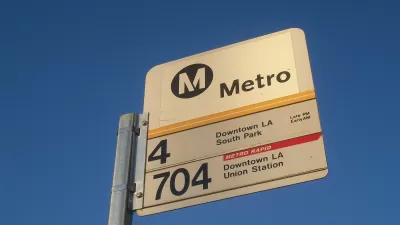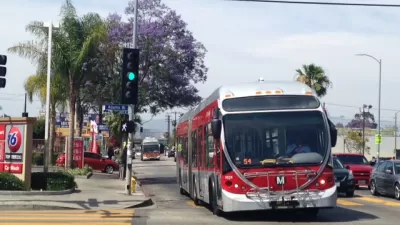The Los Angeles County Metropolitan Transportation Authority (Metro) announced plans last week to undertake a review of the agency's massive bus system. The redesign will hope to address declining ridership.

"After years of relatively few changes, Metro is beginning the process of reimagining and restructuring its bus system [pdf] to better meet the needs of past, current and future riders," reports Steve Hymon.
After stressing that Metro is only beginning the process (more on that later), Hymon lists some key takeaways for interested observers, including a timeline of next steps. By the end of the year, Metro plans to hire a consultant to "identify the different transit markets in L.A. County; study the agency’s current bus system and how well it serves current and potential customers, and; recommend how best to transform the system to be more relevant to what people want today." Metro plans to complete the review of the bus system by 2019.
Hymon also notes that that the Metro bus system has seen substantial decline in ridership in recent years, similar to the experience of bus systems in other metropolitan areas. Hymon says Metro's goal with the review is to "retain current riders, reclaim past riders and recruit new riders."
The new plan would seem to follow up on the recommendations of a "Blue Ribbon Committee," presented to Metro in July 2015. Hymon did not mention whether those recommendations would inform the new review process.
FULL STORY: Metro plans to reimagine and restructure its vast bus system

Planetizen Federal Action Tracker
A weekly monitor of how Trump’s orders and actions are impacting planners and planning in America.

Map: Where Senate Republicans Want to Sell Your Public Lands
For public land advocates, the Senate Republicans’ proposal to sell millions of acres of public land in the West is “the biggest fight of their careers.”

Restaurant Patios Were a Pandemic Win — Why Were They so Hard to Keep?
Social distancing requirements and changes in travel patterns prompted cities to pilot new uses for street and sidewalk space. Then it got complicated.

Platform Pilsner: Vancouver Transit Agency Releases... a Beer?
TransLink will receive a portion of every sale of the four-pack.

Toronto Weighs Cheaper Transit, Parking Hikes for Major Events
Special event rates would take effect during large festivals, sports games and concerts to ‘discourage driving, manage congestion and free up space for transit.”

Berlin to Consider Car-Free Zone Larger Than Manhattan
The area bound by the 22-mile Ringbahn would still allow 12 uses of a private automobile per year per person, and several other exemptions.
Urban Design for Planners 1: Software Tools
This six-course series explores essential urban design concepts using open source software and equips planners with the tools they need to participate fully in the urban design process.
Planning for Universal Design
Learn the tools for implementing Universal Design in planning regulations.
Heyer Gruel & Associates PA
JM Goldson LLC
Custer County Colorado
City of Camden Redevelopment Agency
City of Astoria
Transportation Research & Education Center (TREC) at Portland State University
Camden Redevelopment Agency
City of Claremont
Municipality of Princeton (NJ)





























